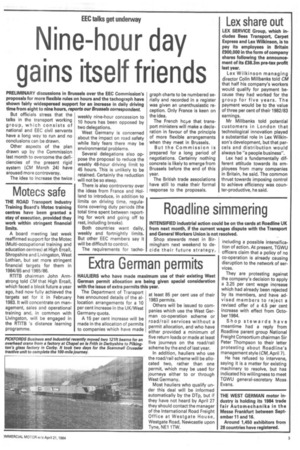Nine-hour day gains itself friends
Page 5

If you've noticed an error in this article please click here to report it so we can fix it.
PRELIMINARY discussions in Brussels over the EEC Commission's proposals for more flexible rules on hours and the tachograph have shown fairly widesperead support for an increase in daily driving time from eight to nine hours, reports our Brussels correspondent.
But officials stress that the talks in the transport working group, which consists of national and EEC civil servants have a long way to run and no conclusions can be drawn.
Other aspects of the plan drawn up by the Commission last month to overcome the deficiencies of the present rigid system (CM March 24) have aroused more controversy.
The idea to increase the twice weekly nine-hour concession to 10 hours has been opposed by two delegations.
West Germany is concerned about the impact on road safety while Italy fears there may be environmental problems.
Several delegations also oppose the proposal to reduce the weekly 48-hour driving limit to 45 hours. This is unlikely to be retained. Certainly the reduction will not be so steep.
There is also controversy over the ideas from France and Holland to introduce, in addition to limits on driving time, regulations covering duty periods (the total time spent between reporting for work and going off to rest, including breaks).
Both countries want daily, weekly and fortnightly limits. But other EEC members say it will be difficult to control.
The requirements for tacho graph charts to be numbered serially and recorded in a register was given an unenthusiastic reception. Only France is keen on the idea.
The French hcpe that transport ministers will make a declaration in favour of the principle of more flexible arrangements when they meet in Brussels.
But the Commission is prepared for a long period of negotiations. Certainly nothing concrete is likely to emerge from Brussels before the end of this year.
The British trade associations have still to make their formal response to the proposals.




















































































